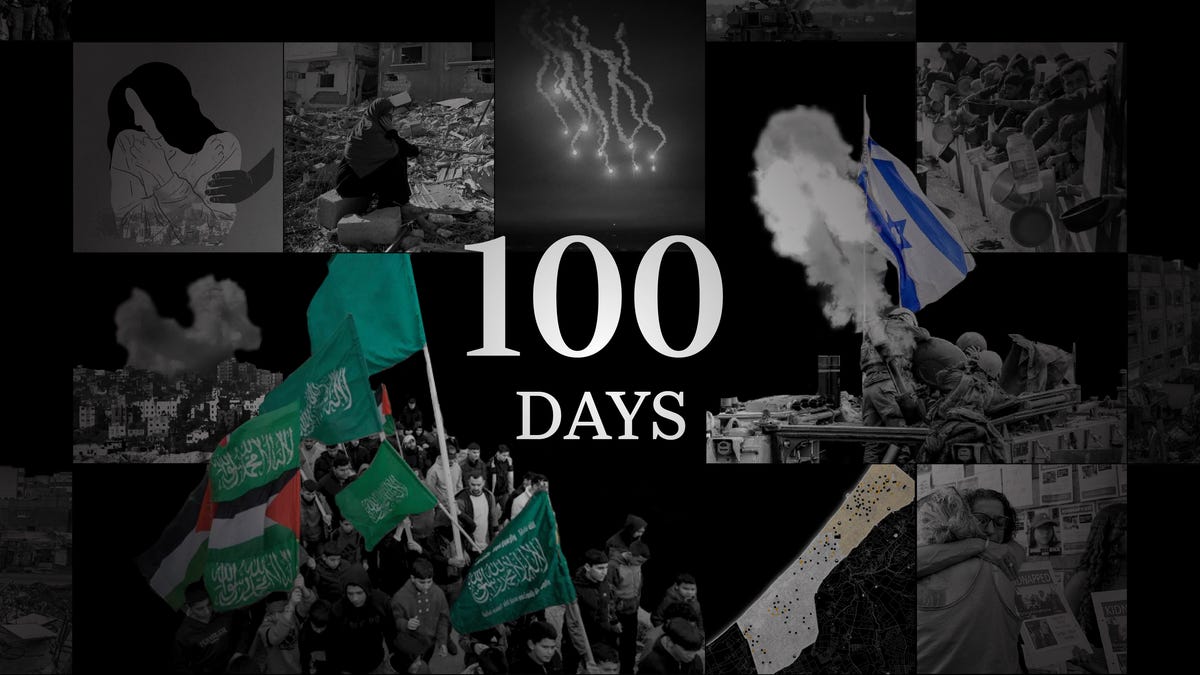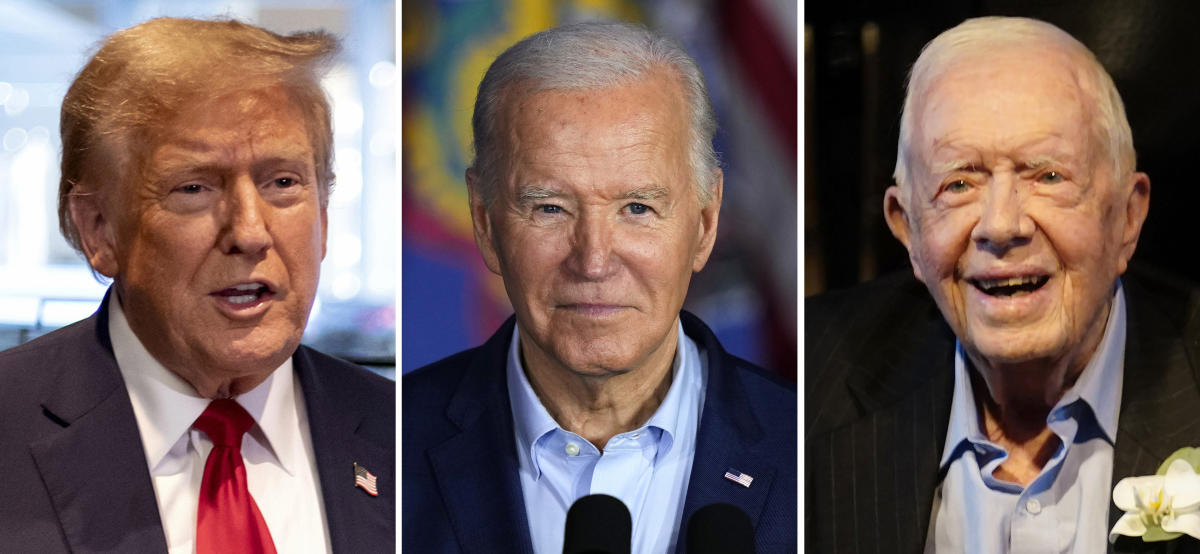A harrowing 100 days.
That’s how long, as of Jan. 14, Israel and Hamas have been at war in the aftermath of the worst attack in Israel’s history. Its impact has been felt far, wide and deep − and it’s not over.
It’s a conflict that has upended life for Israelis and Palestinians; caused death, suffering and destruction on a massive scale; further polarized long divided views; reshaped the dynamics of the Middle East; and stirred international political and emotional turmoil. It has even threatened to impact the 2024 U.S. election.
Here are some of the storylines, defining moments, devastating impacts and still-emerging developments connected to a war that has shocked, angered, dominated, surprised, confused and moved many of us.
How it unfolded
Just before 6:30 a.m. on Oct. 7, 2023, Hamas fired thousands of rockets as it attacked Israel by air, land and sea. Hamas fighters stormed dozens of communities along Israel’s southern border with the Gaza Strip, a Palestinian enclave, murdering at least 1,200 people and kidnapping 240 others, who were taken back to Gaza.
Hamas’ attack was a massacre. Among those killed on Oct. 7 was Cindy Flash, 67, an American mom originally from St. Paul, Minnesota. Flash had spent a lifetime advocating for the rights of Palestinians.
How Israel reacted
Within hours of the attack, Israeli Prime Minister Benjamin Netanyahu ordered retaliatory airstrikes on Gaza, 140 square miles of relatively flat coastal plain bordering Israel, Egypt and the Mediterranean Sea. About a week later, Israel told residents in northern Gaza to evacuate south. Many in Gaza said they simply had nowhere to go.
More than three months since the start of Israel’s bombardment, at least 24,000 Palestinians have been killed, the majority women and children, according to the Palestinian Ministry of Health, which is run by Hamas in Gaza.
The context on the context
When Hamas infiltrated Israeli territory on Oct. 7 it was the U.S.-designated terrorist group’s biggest offensive against Israel in years. It was also part of a complex, bitter conflict between Israelis and Palestinians over culture, identity and land that reaches back to World War I and is also rooted in pre-biblical times.
The brutality of Hamas’ attacks on civilians — and the fact that Hamas still has not released all its hostages — has made it difficult for many Israelis to focus on anything beyond the atrocities. For Palestinians, the scale of Israel’s killings of civilians, combined with their long sense of persecution by Israel’s military and loss of land to Israeli settlers, has made it challenging for them to criticize Hamas.
The struggle to bury the dead
In Israel, the authorities and volunteer emergency responders went to great lengths to recover bodies they discovered in scenes of unspeakable horror, often in places where fighting was still taking place. In some cases, remains were charred and mutilated so badly identification was problematic.
In Gaza, large swathes of which lay in ruin due to Israel’s bombing campaign, families resorted to makeshift graveyards dug in empty lots and health workers stored bodies in ice cream freezers as morgues filled up. As of mid-Jan., the Palestinian Ministry of Health estimates that about 7,000 people are still missing under rubble.
Hostages and prisoners
Hamas released a first group of hostages on Nov. 24, 2023. The release was part of a deal with Israel that included a temporary cease-fire in Gaza. As part of the agreement, Israel agreed to free 240 Palestinian prisoners, accused of offenses ranging from throwing stones to attempted murder, from Israeli jails.
The truce lasted seven days. More than 100 hostages were released by Hamas during this time, the majority of them Israeli women and children, but also foreign nationals, some of whom hold dual citizenship. Four Americans were freed. An estimated 129 hostages, including up to six Americans, are still held in Gaza.
Parts of Gaza look like a wasteland
One hundred days into the war, thousands of lives have been lost and countless families torn apart. In Gaza, hundreds of thousands have been displaced and face, the U.N. says, acute shortages of food and medicines. As temperatures plummet, many families are sleeping outside, and infectious disease is spreading.
Israel’s bombardment has crumpled residential apartment buildings. It has leveled entire neighborhoods. Once bustling urban areas lie in ruins, with roads and many public areas transformed into wastelands.
Is Israel guilty of war crimes?
U.N. officials have said they believe both Israel and Hamas have committed war crimes.
Legal experts have for decades argued about what constitutes a war crime based on the Geneva Conventions and other international laws and policies. This involves knotty questions about proportionality, including how and when the killings of civilians can be justified, and what constitutes a protected site.
Israel says it is abiding by globally recognized rules of armed conflict in Gaza, even though it has bombed hospitals, residential buildings and other civilian targets there. But Palestinians, U.N. officials and a growing chorus of international experts − including some former U.S. government war crimes officials − say Israel’s bombing of civilian areas is a clear violation of the internationally recognized rules of armed conflict.
South Africa has asked the International Court of Justice to consider whether Israel is committing genocide against Palestinians in Gaza.
How it tore us apart
In the U.S. and across the world, the Israel-Hamas war has tested friendships, families and colleagues who have differing opinions, world views and degrees of connective tissue to Israeli and Palestinian issues. For many, it’s been hard to talk about the conflict without devolving into heated disagreements.
All kinds of community group texts have unraveled because no one can agree; millennials have walked on eggshells for fear of upsetting their Gen Z partners. Reported incidents of hate crimes and discrimination, with Jews and Muslims and their supporters often the victims, have risen in many cities.
Supporters of Israel take part in ‘March for Israel’ rally in DC
The “March for Israel” rally comes amid global tensions over Israel’s assault on Gaza following attacks from Hamas that left 1,200 Israelis dead.
Death by journalism
The war has exacted a huge toll on journalists in Gaza. In fact, it’s been the deadliest period since the New York-based Committee to Protect Journalists began recording such data in 1992. As of Jan. 8, 2024, at least 79 journalists and media workers were among the more than 23,000 killed since the war began.
Tareq Hajjaj, 30, the Gaza correspondent for Mondoweiss, a news and opinion website, is among those who has been attempting to report in apocalyptic conditions while also trying to take care of his family and stay alive.
War on the American campus
Colleges and universities across the U.S. have struggled with the tense debate and protests over the war, which has put a spotlight on antisemitism, anti-Muslim harassment, free speech and campus safety.
University of Pennsylvania’s president, Elizabeth Magill, and Harvard President Claudine Gay, resigned after participating in a congressional hearing over their response to antisemitism on their campuses.
Sexual violence horror
Israeli volunteers and first responders who collected and helped identify the bodies of those killed by Hamas on Oct. 7 said they observed multiple signs of obvious and incontestable sexual assault on some victims.
But sexual assault appears not to have been confined to Oct. 7. Two Israeli doctors, who have been treating released hostages, and an Israeli military official familiar with the matter, confirmed to USA TODAY that some released hostages revealed they suffered violent sexual assaults in captivity.
Widening international flashpoints
Iran, Houthi rebels in Yemen and the Hezbollah militant in Lebanon have all vowed to come to the aid of Hamas as its fighters and leaders are hunted by Israel in Gaza and Palestinian civilian deaths have hit unprecedented levels. As the war has ground on, the U.S. has bolstered its naval presence in the Mediterranean Sea as it has sought to contain the conflict from spilling over into a wider regional war.
But the risks appear to be escalating.
On Jan. 12, U.S. warplanes, ships and submarines along with British fighters attacked sites in Yemen associated Houthi rebels who, like Hezbollah, are backed Iran. Houthis have been firing dozens of drones and missiles into Red Sea shipping lanes. Meanwhile, though it hasn’t confirmed it, Israel is suspected of killing a senior Hamas militant in an airstrike in Beirut in early Jan. while Hezbollah has fired barrages of rockets into Israel.
Potential impact on 2024
Over the last few months, President Joe Biden has been getting increasingly squeezed within his own party by those who want him to stand strong behind Israel after the worst massacre of Jews since the Holocaust and those warning that the Palestinian people are at risk of annihilation.
Polls have shown a drop in support for Biden among Democrats and among Arab Americans since Oct. 7. “There will be many people who simply will not vote for Biden because of his strong pro-Israel stance, and they were previously reliable Biden voters,” said Max Abrahms, a political scientist at Northeastern University in Boston.
What is Gaza’s future?
Israel has vowed to wage its war in Gaza until it has completely rooted out Hamas. It remains to be seen whether it will accomplish this. Still, once the weapons fall silent what should happen to Gaza? Who should rule it?
Mustafa Barghouti, a onetime Palestinian presidential candidate and the current leader of the Palestinian National Initiative, a West Bank political party, told USA Today’s The Excerpt podcast that in his view there is only one realistic option: a national unity government. Find out what he means by this by listening here.
Other notable stories about the Israel-Hamas war
Contributing: John Bacon, Jorge L. Ortiz, Christopher Cann, Janet Loehrke, Stephen J. Beard, George Petras, Shawn J. Sullivan, Josh Meyer, David Oliver, Leora Arnowitz, Francesca Chambers, Chris Kenning, Veronica Bravo, Ariana Torrey, Ramon Padilla, Alia Wong, Maureen Groppe, Michael Collins, Joey Garrison, Laura Beatty, Tom Vanden Brook, Rick Jervis

David Turner is a globe-trotting journalist who brings a global perspective to our readers. With a commitment to shedding light on international events, he explores complex geopolitical issues, offering a nuanced view of the world’s most pressing challenges.








